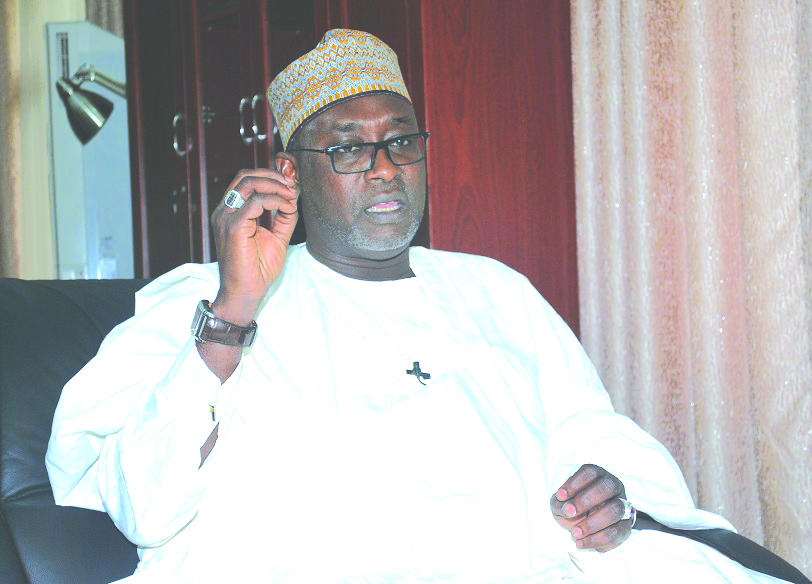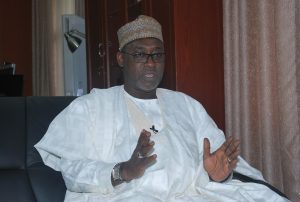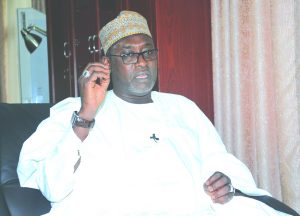Nigeria’s Ministry of Water Resources is headed by a young technocrat from Jigawa State whose avowed mission in public service is to make a difference in the life of the people. Armed with a Bachelor’s degree from the Ahmadu Bello University, Zaria and a Masters from the University of Reading, Engr. Suleiman H. Adamu brings to bear on his assignment as the Minister of Water Resources, an impressive resumé and a load of experience in the water sector. He speaks to Chinedu Obike on the two years of President Muhammadu Buhari’s administration and its impact on his ministry. Excerpts:
How would you rate the performance of the Federal Government, two years after?
Well, I think we are making steady progress; silently of course. We have been accused of not blowing our trumpet but I believe we are doing quite a lot of things in every aspect of governance. I noticed a lot of commentators saying that they are tired of hearing excuses, but the truth must be told. We took over the government in crisis; the country was in crisis, security challenges everywhere. On the economic front, people have decided to develop deliberate amnesia; forgetting the warnings of people like Dr Ngozi Okonjo-Iweala, former Minister of Finance given as far back as 2014 on the situation of the economy of the country, when she said we were borrowing money to pay salaries.
When we won the election, there was a transition committee and I was supposed to work with the government’s transition committee. After the meeting, the then government transition committee refused to cooperate with us and said they were going to give the incoming President a handover report on the 28th of May, 2015, a day before he was sworn in. So, we were in a situation where nobody knew what was happening.
The President didn’t know; the transition committee didn’t know either. The report was eventually handed over to the President on the 28th of May, 2015. Of course, he couldn’t have read the report of that handover that day because he was receiving guests and preparing for the swearing in ceremony on the 29th. So, after the 29th of May, when the President moved into his office, he began to see the issues and all the challenges that were there. But, we thank God that the economic indices are showing a lot of promise, there has been at least some sanity in government spending even though our earnings are still a little challenging. But I think we have brought in a lot of fiscal discipline. Of course, we have also had challenges with the time it has taken for us to pass the budget but, I think we are making a lot of progress and the statistics are there to show for it.
Has the change mantra of the government impacted the water sector?
It is impacting the water sector gradually, this is a huge sector and this is a sector where you don’t see results at the snap of a finger. It’s a gradual process. You have to build infrastructure, you have to build mechanisms to make things work and you need to collect data over a long period of time. You should know that probably water resources is the only sector where if you are designing, you need like 100 years data because a lot of probability and calculations are involved. But, that’s beside the point; the main thing is that when we came in, we needed to revitalize our agencies. The ministry itself was not operating as a professional ministry, changing people’s thought, mindset and perception takes a lot of time. Gradually we are getting there.
The River Basins were anything but functional, but now, we have revived and re-professionalised the management. We are beginning to see results. We have lot of ongoing and abandoned projects; some for 17 years that had not been touched. We are reviving them and you don’t finish that kind of project in two months or two years; projects like that will take three to four years. We are doing a lot of things, we are trying to do something about Lake Chad; we have brought in new policies and for the first time, are going to have a comprehensive water resources law for the country; the second reading in the House of Representatives has been done and soon we are going for public hearing. We have a new road map that is going to last for 15 years; up to the year 2030 relating to what we are going to do in the entire sector. In it, water supply, sanitation and irrigation, all these things are going to evolve over time, but I think we are on the right track and we are going to start seeing some results within the next year or two.
You have been in charge of the Ministry of Water Resources for two years now. What accomplishments have you recorded within the period?
Firstly, I am repositioning the Ministry itself by making workers to understand that we are trying to take them back to their original mandate. We are also revitalising the River Basins. Secondly, we have set up new programmes like the Partnership for Expanded Water Supply, Sanitation and Hygiene (PEWASH) with the aim of really achieving the Sustainable Development Goals (SDGs) and I think if we continue to religiously follow it, we will be on track to achieving sustainable development goals, having failed to achieve the Millennium Development Goals (MDGs).
Thirdly, getting the National Water Resources Policies, National Education Address Policies and the National Water Resources Law are things I find very satisfying. Of course there are other things like the Congo Inter Basin Transfer and the HAWAL Transfer in the North East into the Southern Chad area. Those are what I call the legacy projects or programmes that I hope to pursue.
You made reference to the PEWASH programme. Can you speak more on that?
Well, the idea came to me sometime in January or February, last year, after receiving briefings from the various departments, especially water and sanitation. When I had a meeting with some of our development partners, I started asking them a lot of questions like why did we fail the MDGs, why is it that there are so many projects going on? There were a lot of complaints from these development partners that they are not getting cooperation from the states where the people are living. The people are there in the states, not in Abuja and they are the people that drink the water and enjoy the sanitation.
So, this idea came to me that we needed to provide leadership at the federal level; to take ownership of the programmes and all the scattered water and sanitation projects that are going on and we need to scale up and move away from all these piled up projects in one or two states and really bring water and sanitation to the front burner. Everybody must be involved: corporate Nigeria, banks, philanthropic organisations, religious organisations and communities. Everybody must play a role in delivering water and sanitation facilities in the country and that is why we initiated PEWASH. We now have political leadership at the federal level and are now taking it down to the states to make them more responsible to the needs of water supply and sanitation in the country.
How will PEWASH address the paucity of pipe-borne water in many parts of Nigeria?
For now, what PEWASH is doing is to analyse the MDGs report. Although we achieved 69%, we are six points shy of 75% target for water supply. We realised that many people, about 50% or thereabout, don’t have access to water supply and they are in the rural areas, so of course there is need for inclusion in the SDGs; for inclusion and equity and fairness and a lot of things there. So we said okay, we need to start with the most vulnerable communities. PEWASH initially is targeting the rural areas, but if you look at the entire document you will also identify that along the line we will move to the small towns’ water supply schemes. But then what we are doing is just an attempt at intervention because the political arrangement in the country vests water supply, in the pipes and through to the taps in cities, on state governments. That is why Federal Government does not have a water board except for FCT water board which is for the territory and operates under the Federal Capital Territory administration. We, as a ministry, do not own or run a water board. It is the states that do and it is their responsibility to provide water.
So, we have been intervening in the rural communities and there had been lots of interventions before. Federal government has guaranteed many loans over the last decades to state governments to rehabilitate their schemes or to expand or set up new ones. But there are so much more to be desired; it is either that they are not functioning or that they are not maintaining them. I know part of the problem is energy and it is beyond them. If you don’t have water supply it is not sustainable to keep running water schemes, so, there is that problem. But the point I’m trying make is that the states must do more; they must invest more and they are the ones that need to provide water and the taps. So it is always unfair and misguided to ask the minister of water resources why there is no water in the tap. But we are supporting them in every way we can. The National Water Resources Policy now provides that the Federal Government can provide up to 30% contributions to states that want to invest in water supply, so it’s open, but the problem is that most state executives want to commission projects within their town. In a typical city, you need to invest for five to six years continuously to revive the water schemes but usually the time is four years and so on. So, it may result to drilling bore holes everywhere. And the shocking thing now is that from about 32% of our population were serviced with pipe-born water in the 90s, we have dropped to 7%. So, now only 7% of the Nigerian population is serviced with pipe-born water. It is serious problem and I think the time has come for us to declare a state of emergency on water and sanitation in this country.
What is the new Water Resources Policy which is receiving legislative attention at the National Assembly designed to achieve?
First of all we are consolidating all the laws; the Water Resources Act, the River Basins Act and you know that other agencies also have their separate acts, as well. We are now consolidating everything into one legislation.
Secondly, there are conflicting laws in some agencies like the National River Basin Authority and the ministry of environment, with overlapping functions. So the law has to identify those issues and streamline them.
Thirdly, we are using the law to transform our irrigation practice in the country. The law would help us to regulate the proliferation and indiscriminate drilling of bore holes. The law would also help us to bring states and their communities into water resources management under what we call Catchment Management Committees. So they would now be responsible for monitoring and overseeing what is happening in the various water catchments in such issues as pollution and deforestation among others.
The Kashimbila Dam project is a very ambitious one which you inherited from the immediate past administration. What is the state of the project now?
Well, the dam now has now reached the full supply level. So far, it’s been speeding and the power plant is ready but we need the transmission light to be ready and that is a separate contract under the ministry of Power. In fact, the 14 mega power plant itself is ready and we have all the components of power supply on ground; the contractors will continue with the work. We have several approvals for the review in the reverse cost of the project which we negotiated with the contractors and they are back on site. It is our hope that the transmission as well will be finished and the water supply will be free. Of course, we also have a 2000-hectre irrigation still there, the design is ready and the contractors will soon begin to work on them.




